'She was once asked what the secret to political leadership was and she said it was the ability to like all kinds of people.'
'I don't think Rahul fundamentally likes people -- that's probably why he can't deal with them and it shows.'
'Sonia is a more talented political mobiliser than her son, but I think the decline of the Congress set in in 1969...'
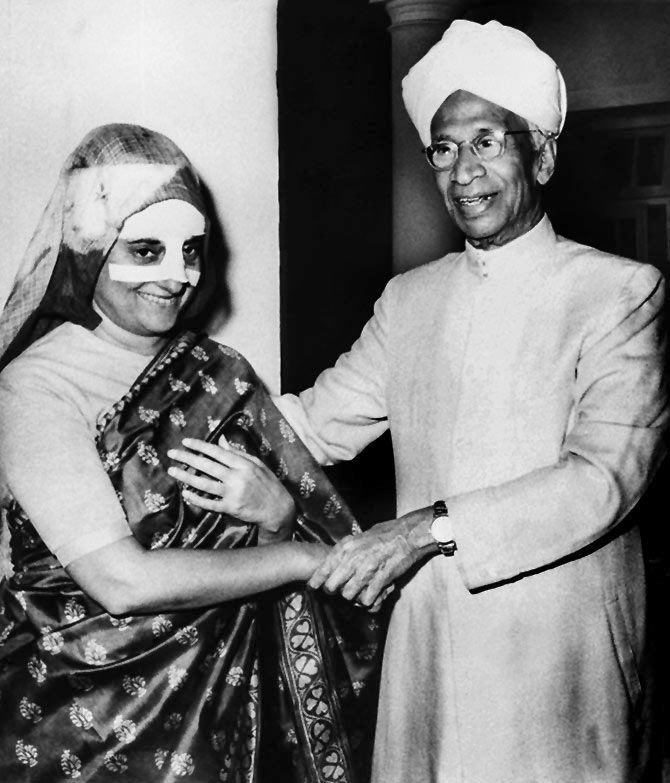
Indira remarked that she looked 'like Batman'.
Photograph: Everett Collection, Alamy/Kind courtesy Juggernaut
Indira Gandhi enunciated the Dynastic Principle in Indian politics.
A simple equation where power passes seamlessly from parent to child bypassing democratic processes in parties that otherwise chest thump their commitment to democracy.
Like all discoveries, Indira Gandhi stumbled on it by accident when she was confronted by the quick troubles that came her way just a couple of years after she was heralded as the Ma Durga incarnate in the precincts of Parliament following the disemberment of Pakistan.
First the Great Railway Strike of 1974; followed by sustained intransigence first in Gujarat, then in Bihar, then in other provinces in North India led by a maverick who shunned the lure of office; and finally the Allahabad high court judgment of March 12, 1975 which unseated her in Parliament on charges of electoral malpractice.
Clearly besieged, Indira Gandhi shunned the revolving door of wannabe rasputins who advised her through her nascent years as prime minister and sought comfort and counsel in her younger son and his clearly unNehru ways.
And when Sanjay Gandhi died in an aircrash on June 23, 1980, Indira Gandhi turned, as Sagarika Ghose reveals in her riveting biography Indira: India's Most Powerful Prime Minister to the son who had not spoken to her for three years.
Bloodline was now clearly entrenched in Congress politics. And it was only a matter of time that parties as diverse as the Shiv Sena and the DMK, the Biju Janata Dal and the Samajwadi Party photocopied the Congress' dynastical way of political succession.
Sanjay's death also commenced the slow decline of Indira Gandhi, the master politician.
She still remained firmly in charge, brooking no opposition -- even turning out her younger daughter-in-law Maneka Gandhi from the family home as Ghose discloses in her book -- but the political smarts, that assured decisiveness and the unwavering poise had begun to abandon her.
Sagarika Ghose tells Rediff.com's Nikhil Lakshman that Indira Gandhi may have left India had Lal Bahadur Shastri not died suddenly in Tashkent in January 1966, a death which led the Congress Syndicate to opt for someone they mistakenly assumed was a 'goongi gudiya' (dumb doll) rather than the obstinate Morarji Desai.
- Part 1 of the interview: 'Indira Gandhi was the James Bond of power politics'
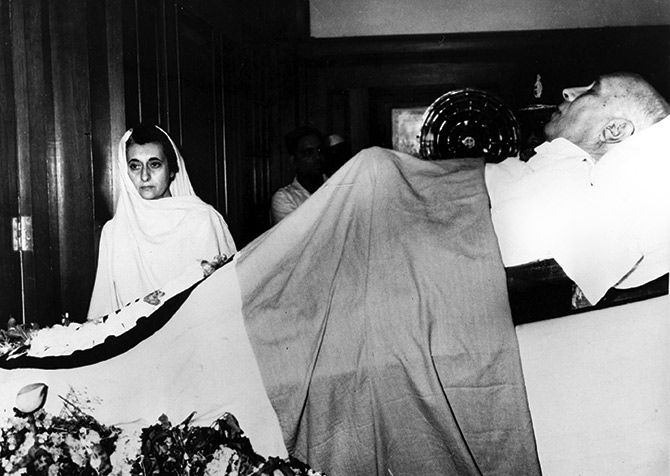
Nehru's successor Prime Minister Lal Bahadur Shastri apparently insisted that Indira join his Cabinet.
An announcement to this effect was made on the radio, presenting Indira with a fait accompli.
Photograph: Rolls Press, Popperfoto, Getty Images/Kind courtesy Juggernaut
What political lessons -- if any -- do you think she learnt from her father, Jawaharlal Nehru?
Clearly, she was not a devotee of democracy and for the need to preserve the institutions that guarantee a state of democracy like Mr Nehru was?
Was she disdainful about his political beliefs and his politics?
Was he her political guru?
Or did Indira Gandhi have no political gurus, but the lessons and experiences she imbibed during her long apprenticeship?
Good question.
She learnt her ideological stances, socialism, internationalism, her commitment to the Non-Aligned Movement, foreign policy priorities, etc, from her father but, in the end, turned her back on his most precious legacy -- Constitutional democracy.
She thought of her father as a 'saint'.
She once said he was a saint who strayed into politics and felt he had been attacked when he was vulnerable, particularly after the 1962 war.
I think she played a rougher, more brusque politics that her father because:
- a. She was confronted by bitter rivals in a way that he was not and,
- b. felt her father had been too soft with his detractors.
She was quite influenced by her husband's politics too; in fact, Feroze Gandhi was more of her guru than her father.
It was Feroze who brought her into radical socialism, got her interested in the British Labour party, etc.
But, in the end, she was her own political guru.
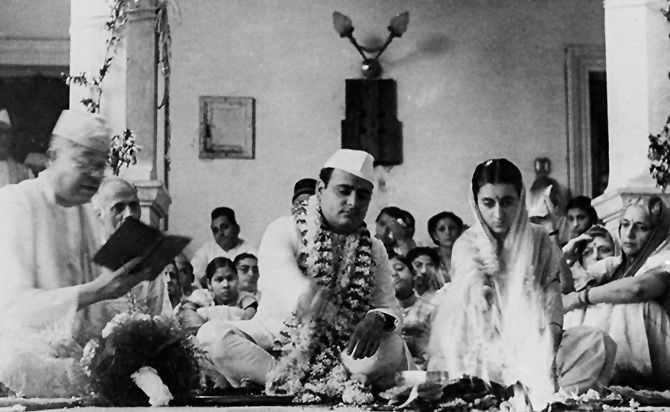
Seated on the extreme right is her aunt Vijayalakshmi Pandit.
Nehru was at first opposed to the match and relented only after Mahatma Gandhi intervened.
Indira wore a sari woven of thread spun by Nehru.
Photograph: Bettmann/Getty Images/Kind courtesy Juggernaut
Your friend Ram Guha has repeatedly emphasised that it was never Mr Nehru's intention to impose a sense of dynasty on the Congress party or India.
Do you believe that Indira Gandhi had no such reservations, that she always believed in her inheritance, that she, like Caesar, turned down the crown that was tentatively offered her after her father's death till it was a more opportune time?
When do you think Indira Gandhi began planning her subtle, not overt, campaign for the prime ministership?
There is absolutely no historical evidence to show Nehru was grooming his daughter to become prime minister or even take over his mantle.
I don't think Nehru, in his wildest dreams, ever thought she would ever be prime minister, however many people may have suggested it.
I think, after he died, she began to grow determined to become his sole legatee.
But, as I show in my book, she was always politically very ambitious.
In fact, she was never a goongi gudiya; she was always an ambitious, formidable alpha-female.
What if Mr Shastri had not died in Tashkent? What if he had had a longer tenure as prime minister than the 18 months he had?
Would Indira Gandhi have waited in the wings?
Or would her ambition and impatience have led her to make an eventual bid for the leadership?
I know this question is in the realm of the What Ifs of history, but, from your investigation into her life and politics, what would you surmise?
Perhaps she would have left India, as she confessed to wanting to do, in her letters to Dorothy Norman at this time!
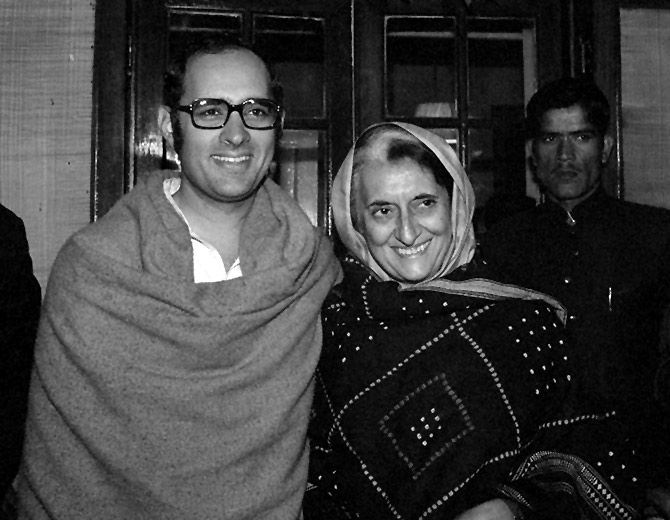
In 1977, Indira and Sanjay both lost their Lok Sabha seats.
Photograph: Bettmann/Getty Images/Kind courtesy Juggernaut
How did the goongi gudiya, mocked by the S K Patils and Atulya Ghoshs of the world, transform into the cunning, assured leader that we know her?
Were these character implants always present in her, but suppressed by who she was till her father and Mr Shastri's deaths?
Were they released by her anger at the Syndicate's contempt towards her, their confidence that she was a pawn to do their bidding?
Did it incubate in her a distrust of people which led to her dependence on, first, Sanjay, and, after his death, Rajiv, the seeds for a political dynasty sown by political suspicion?
She had to fight her way up through implacable hostility and opposition, in spite of being Nehru's daughter.
In fact, in the course of my research, I found myself wondering that, if she had not split the Congress in 1969, perhaps the Syndicate would have destroyed her.
They were simply not willing to concede any autonomy to her.
She, for her part, was equally domineering and wanted to take over a party she believed was hers by birth.
Indira Gandhi was convinced that her family and her bloodline was destined to rule India -- there were no doubts in her mind about this.
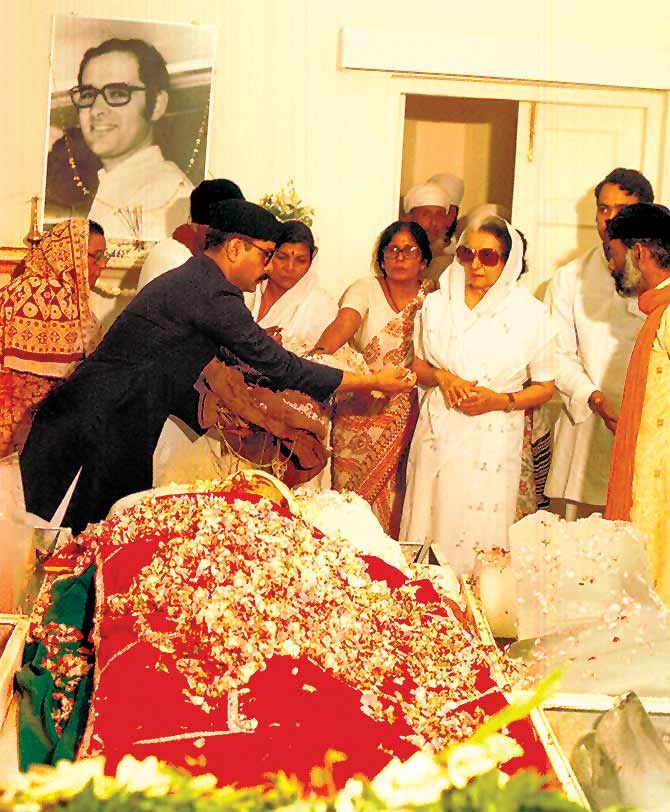
Sanjay died in a plane crash.
Indira visited the site of the wreckage twice, inspecting the debris as if looking for bits of her son.
Photograph: The India Today Group/Getty Images/Kind courtesy Juggernaut
In your understanding, what was the turning point for Indira Gandhi, seemingly ill-confident politician to turn into who we know her by?
Can we expect such a transformation for her grandson, who is mocked daily by the social media and news television obsessed class of Indians?
Why/Why not?
Is it because Indira Gandhi was, like Mr Modi and Mr Shah, a 24x7x365 politician and Rahul Gandhi is possibly a 7x5x220 leader?
Do you think it is still possible for Rahul to evolve into a real contender for power in 2019?
Why has Mr Modi, at 66, been able to connect with India's youth, and Rahul, 20 years younger, failed?
Rahul has to learn a lot from his grandmother.
She was a natural born 24x7 politician who could outpace all her rivals just on sheer physical stamina.
She played politics with the ease of a sleepwalker -- she knew the terrain so well, she could do it in her sleep!
She was a constant communicator, a constant traveller, disposed off government files at lightning speed in between rallies, lived on a frugal diet, practiced yoga and never ever missed a political moment.
If Indira Gandhi had been a young politician today, she would have been in the forefront of the Not In My Name protests.
As a youth leader, I can see her marching in the Nirbhaya protest rallies.
She was once asked what the secret to political leadership was and she said (it was) the ability to like all kinds of people.
I don't think Rahul fundamentally likes people -- that's probably why he can't deal with them and it shows.
Modi's a terrific communicator too, that's why perhaps he's been able to reach out to the youth.
Indira Gandhi was cut from a different cloth from Rahul -- as I said, in politics, she was James Bond.
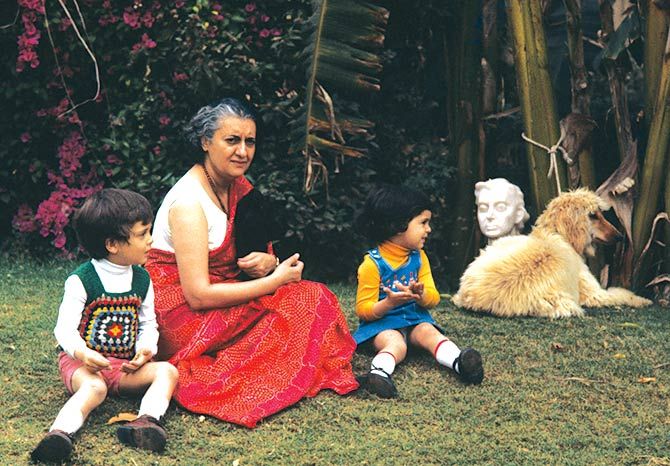
She loved spending time with her grandchildren, playing with her many dogs, and doing crosswords.
Photograph: Gery Gerard/Getty Images/Kind courtesy Juggernaut
You didn't know Indira Gandhi, but you have reported on her daughter-in-law and her grandchildren. Have they learnt any lessons from her politics?
Is their style of politics more from the Rajiv Gandhi school of leadership than the Indira Gandhi school? Does that make them redundant in today's politics in India?
Will they lead the Congress to political oblivion, where Mr Guha predicts that party is headed, like the once unassailable Liberals in Britain?
In a way, the decline of the Congress began with Indira Gandhi, precisely because she destroyed local leaders and transformed the Congress into a party of sycophants.
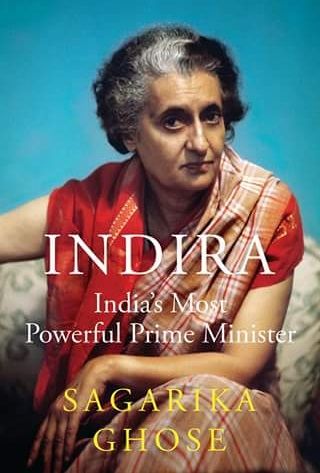
Local political talent was decapitated; any show of political virility immediately alerted her to danger.
She constantly preferred loyalty over competence.
If she had not been assassinated, the Congress may not have won the 1985 elections -- it may have just been the single largest party.
Sonia Gandhi is a more talented political mobiliser than her son, but I think the decline of the Congress set in in 1969, when Indira split the party and made it a group centred entirely on herself and her leadership.











 © 2025
© 2025